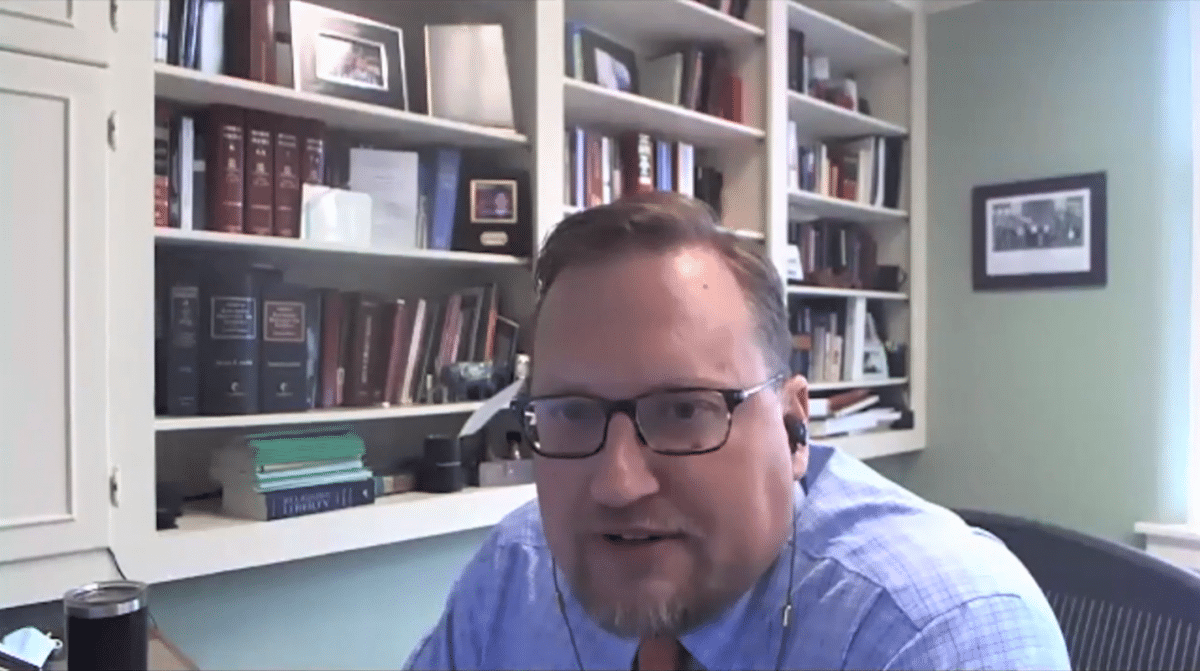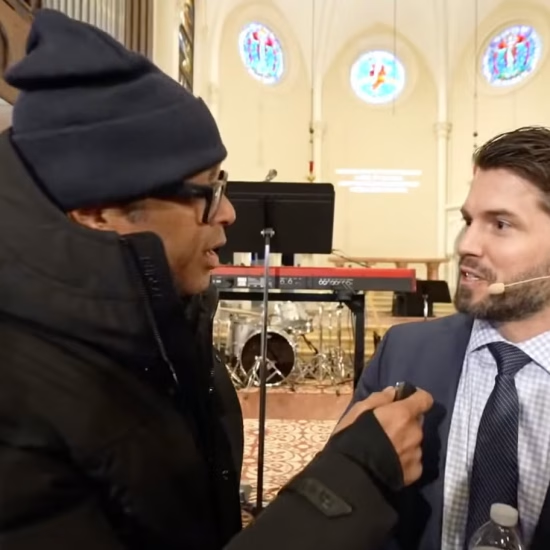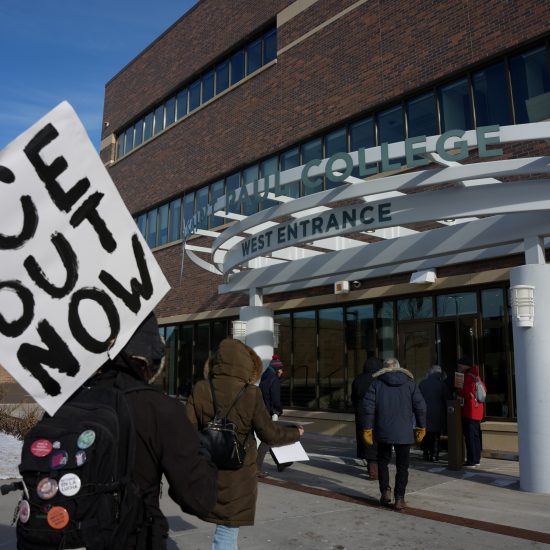
Amid debates within the Southern Baptist Convention over investigating clergy sexual abuse, a trustee of the SBC’s Ethics & Religious Liberty Commission penned a letter attacking former ERLC President Russell Moore. Jonathan Whitehead, an attorney in Missouri, used his letter to criticize Moore for claims made in a leaked letter. Whitehead’s Sept. 17 letter was itself leaked and published this week by a blog long critical of Moore for opposing Donald Trump, welcoming refugees, and encouraging mask wearing during the pandemic.

Abuse survivor Rachael Denhollander discusses the Southern Baptist Convention’s history of addressing sexual abuse with then-ERLC President Russell Moore at the Caring Well conference in Dallas, Texas, on Oct. 4, 2019. (Karen Race Photography 2019/Religion News Service)
After Moore resigned as ERLC head in May, an ERLC trustee on May 29 leaked a letter Moore wrote the previous year in February 2020. In that letter, Moore complained about living in “psychological terror” while being “attacked with the most vicious guerilla tactics.” He also wrote in the letter that leaders of the SBC’s Executive Committee tried to stop efforts to expose clergy sexual abuse.
After the release of the letter — and audio clips of key SBC EC leaders showing reluctance to address clergy sexual abuse — SBC messengers voted at the annual meeting in June for the creation of a Sexual Abuse Task Force to oversee an investigation how the EC has handled clergy sexual abuse claims. The motion also called on the EC to waive attorney-client privilege so the investigators could have access to all relevant documents.
On Tuesday, the EC voted for the second time in as many weeks not to waive privilege, despite the directive from the messengers. The Task Force continues to demand that, and is pushing for the EC to sign the contract with that clause with the investigative firm Guidepost Solutions.
Whitehead doesn’t think the EC should waive privilege. So, he penned a letter to Bruce Frank, chair of the Task Force; Julie Myers, a lawyer with Guideposts Solutions; and Ronnie Floyd, president and CEO of the SBC’s EC.
In the letter, Whitehead complained that Moore’s allegations were leaked: “The best explanation for the facts is that the letters were drafted for public, not private, consumption.” But like the Moore letter he complains about, Whitehead’s letter now has public consumption.
Whitehead claimed Moore and ERLC Board Chair David Prince committed “blatant deception” in hiding Moore’s claims. Whitehead added that he believes “the letters were not designed for action by the ERLC Board; they were written and leaked to shake messenger trust and confidence at an SBC annual meeting.”
Whitehead sees this as a conspiracy “to deprive the Convention of confidence in its entire fiduciary system” and the use of “survivors’ concerns as means to Baptist political ends and power.” He therefore suggested that the motion to create the Task Force and demand the SBC EC waive privilege was wrongly passed. While some critics of the EC have argued the EC actions have created a polity crisis by ignoring a direct mandate of the messengers, Whitehead instead argued the leaked letters misled messengers to create the problem.
“These letters triggered a polity and trust crisis. As a result, Messengers felt compelled to appoint a Task Force to investigate those allegations,” Whitehead wrote. “If deception can be used to push Messengers to create a polity crisis at a single annual meeting, the Convention will see repeated ‘June 1 Surprises,’ trying to deprive messengers of confidence in their institutions in pursuit of some goal or another. The Convention may not long survive.”

Screengrab of Jonathan Whitehead making a motion during an ERLC trustee meeting in September 2020.
Whitehead claimed in his letter that he tried to help Moore by making a motion during the September 2020 ERLC trustee meeting. But his motion was actually for the trustees to go around Moore and talk with ERLC staff about their “morale.” Other ERLC trustees rejected Whitehead’s motion because they believed it would undermine Moore’s leadership and invite trustee micromanagement.
Whitehead made this motion in the midst of an ongoing EC investigation of Moore and the ERLC — the second time during the Trump presidency Moore faced such a politically-motivated investigation as some sought to push him out of leadership. ERLC trustee officers like Prince denounced the second investigation targeting Moore as “unwarranted, divisive, and disrespectful.”
Whitehead went on in his letter to criticize Moore for having a problem with “fury,” suggesting Moore wrote his letters just “for revenge.”
Since Whitehead’s letter went public, some individuals have offered refutation. Todd Benkert, lead pastor of Oak Creek Community Church in Mishawaka, Indiana, offered a motion at the SBC annual meeting in June for the ERLC to perform a three-year audit of sexual abuse in the SBC (in addition to the separate motion by another pastor that created the Task Force to investigate the SBC’s EC on this topic). The trustees approved Benkert’s request for an investigation during its Board meeting held just days before Whitehead penned his letter.
“I attended the full meeting of the ERLC trustees,” Benkert tweeted on Sept. 30 after the leak of Whitehead’s letter. “Two observations: 1. They voted to be fully cooperative and transparent w/anything asked by investigators. 2. Whitehead’s only contribution was adding a layer of bureaucracy to the sexual abuse audit to delay its implementation.”
Jonathan Brooks, lead pastor at Refuge Church in Raleigh, North Carolina, took to Twitter the same day to suggest Whitehead was “doing the very thing he’s accusing Moore of doing” since “he has been sitting on this information for 4 months and only now decides to make a statement.” Brooks added it seemed like Whitehead is “trying to use this to distract or deflect from the current Task Force efforts and @SBCExecComm debacle.”
Whitehead has served alongside his father, Michael, as an attorney for the Missouri Baptist Convention.






